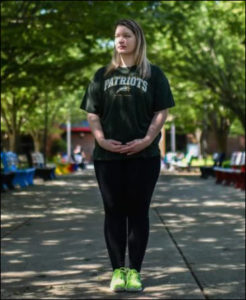
Katie Otersen on the GMU campus. Photo credit: Washington Post.
When Katie Otersen transferred from Northern Virginia Community College to George Mason University last fall, tuition and fees totaled $11,300, more than double what she had paid before. Working at a salon, she struggled to pay her bills. Seeking to make a payment in May, she was shocked to learn that GMU had sent her account to a collection agency, which had tacked on a fee of 30 percent.
“I can’t argue or negotiate this. I’m just stuck paying almost $1,000 more,” Otersen told the Washington Post. “The fact that they charged me as a student who has been paying throughout the semester this 30 percent fee is disgusting.”
Otersen, says the Post, is one of thousands of Virginia students caught in a “state-sanctioned debt trap.” When students lack the money to pay their bills on time, they are penalized in a way that makes it harder to meet the obligation.
A Virginia statute requires public colleges and universities to hand over student accounts of less than $3,000 that are 60 days past due to private debt collectors. These companies can charge up to 30% of the outstanding balance as a fee. Past-due accounts of more than $3,00 are referred to the state attorney general’s office, which also pockets a 30% fee.
GMU often gives students five months and eight notices to make arrangements to settle their accounts. Unpaid debts, in most cases, are not referred to a collection agency until after the semester ends, said GMU spokesman Michael Sandler. “We can’t allow students to create their own payment plans. We are bound by state law and have an obligation to be responsible stewards of the taxpayers’ money.”
Bacon’s bottom line: The Post seems to think there is something wrong with charging the collection fees. States the article: “Those fees may be placing students with limited means at risk of falling behind in school and not graduating.”
Yeah, and people with limited means who fail to pay their rent are at risk of being evicted. And people with limited means who fail to pay their electric bill are at risk of getting their juice turned off. And people with limited means who fail to make their car payments are at risk of having their wheels repossessed. That’s the way it works.
Indeed, students are less worthy of sympathy than most. After all, they have the option to take out student loans, which, from what I gather, anyone and everyone qualifies for. I admire Ms. Otersen for working her way through college — something I never had to do — and I hope she earns a degree. But perhaps someone should have advised her to take out student loans, which she can repay at her leisure.
The affordability problem in higher ed doesn’t stem from outsourcing debt collections. It arises from runaway costs and reductions in state support. Virginia’s public universities warrant closer scrutiny for ever-escalating charges for high tuition, fees, room and board, but not for turning over bad debts to collection agencies, a standard practice in every industry. Just wait until Ms. Otersen discovers what happens when she’s late on her income tax payments!


